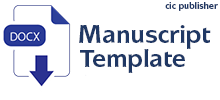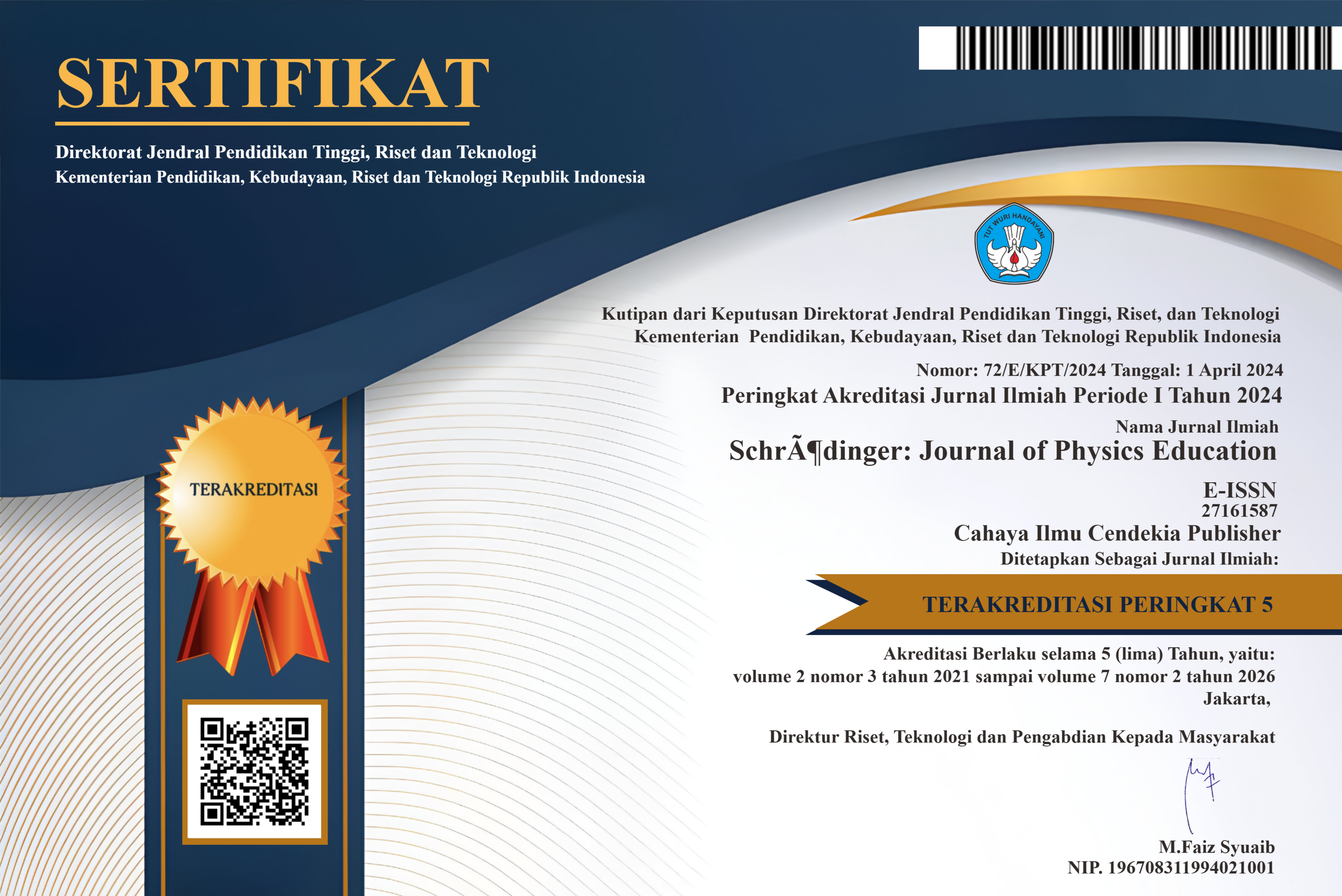Exploring Character Dynamics: Unveiling Dominant Values in Physics Education
Abstract
Purpose of the study: This research aims to determine the character values that are more dominant among teachers in students, with a focus on eliminating values such as integrity, honesty, discipline, caring and responsibility in the context of learning at school.
Methodology: This research uses mixed methods with quantitative and qualitative descriptive approaches. The population is all physics teachers at Darul Ulum Private Madrasah Aliyah, with a sample of three teachers selected purposively. Research instruments include questionnaires and interviews, with data analysis using partial analysis for quantitative and the Miles and Huberman model for qualitative.
Main Findings: The results of the research show that of the three character values studied, the one that appears more dominant in students is the discipline character value of 88.89%, where students always follow and carry out the rules set by the school, then the responsibility character value is 86%, In students there is still a high value of responsibility for what is a burden and looking after goods or whatever is their responsibility. Finally, the honest character value was 84.75%, a character value that was lower than the character value studied.
Novelty/Originality of this study: This research highlights the determination of dominant character values in students, especially in discipline, responsibility and honesty in learning physics. With a sample of three physics teachers, this research uses quantitative descriptive methods and partial data analysis to reveal a new understanding of student character in the context of learning at school.
References
U. Sahid, I. Wasliman, H. S. Muchtar, and H. S. Insan, “Management of Student Characteristics Through Extracurricular Activities in The School Environment Based on Islamic Boarding Schools,” Munaddhomah J. Manaj. Pendidik. Islam, vol. 2, no. 2, pp. 116–125, 2021, doi: 10.31538/munaddhomah.v2i2.97.
J. D. Saputro and M. Murdiono, “Implementation of Character Education through a Holistic Approach to Senior High School Students,” Int. J. Multicult. Multireligious Underst., vol. 7, no. 11, pp. 460–470, 2020, doi: 10.18415/ijmmu.v7i11.2146.
Iskandarsyah Siregar, “The Role of Language in a Dynamic Situation of Globalization,” Britain Int. Linguist. Arts Educ. J., vol. 5, no. 1, pp. 49–59, 2023, doi: 10.33258/biolae.v5i1.868.
Astalini et al., “Identification of student character values in class x particle dynamics materials,” JIPF (Jurnal Ilmu …, vol. 8, no. 3, pp. 380–388, 2023, doi: 10.26737/jipf.v8i3.3776.
N. K. Sari and L. D. Puspita, “Implementasi Pendidikan Karakter di Sekolah Dasar,” J. DIKDAS BANTARA, vol. 2, no. 1, pp. 57–72, 2019, doi: 10.47466/hikmah.v17i2.198.
A. Abdul Razak, F. Jannah, and K. Saleh, “Pengaruh Pembelajaran Pendidikan Agama Islam Terhadap Perilaku Siswa di SMK Kesehatan Samarinda,” el-Buhuth Borneo J. Islam. Stud., vol. 1, no. 2, pp. 95–102, 2019, doi: 10.21093/el-buhuth.v1i2.1582.
N. Susilawati, “Merdeka Belajar dan Kampus Merdeka Dalam Pandangan Filsafat Pendidikan Humanisme,” J. Sikola J. Kaji. Pendidik. dan Pembelajaran, vol. 2, no. 3, pp. 203–219, 2021, doi: 10.24036/sikola.v2i3.108.
C. Bellei and G. Munoz, “Models of regulation, education policies, and changes in the education system: a long-term analysis of the Chilean case,” J. Educ. Chang., vol. 24, no. 1, pp. 49–76, 2023, doi: 10.1007/s10833-021-09435-1.
M. A. Pisnaji, A. A. Putri, and H. Ramadani, “Mengindentifikasi Sikap dan Karakter Toleransi Siswa Sekolah Menengah Atas,” Schrödinger J. Phys. Educ., vol. 1, no. 4, pp. 107–111, 2020, doi: 10.37251/sjpe.v1i4.445.
N. I. M. Agustina, E. A. Ismaya, and I. A. Pratiwi, “Dampak Penggunaan Gadget Terhadap Karakter Peduli Sosial Anak,” J. Basicedu, vol. 6, no. 2, pp. 2547–2555, 2022, doi: 10.31004/basicedu.v6i2.2465.
N. Juharti and L. Kartika, “Comparison of Student Learning Outcomes in Class VIII SMP Negeri 2 Muaro Jambi,” Integr. Sci. Educ. J., vol. 2, no. 1, pp. 13–19, 2021, doi: 10.37251/isej.v2i1.127.
S. Sumartias, A. A. Unde, I. P. Wibisana, and A. R. Nugraha, “The Importance of Local Wisdom in Building National Character in the Industrial Age 4.0,” in ICLIQE, 2020, pp. 1305–1312. doi: 10.2991/assehr.k.200129.159.
Darmaji, D. A. Kurniawan, Astalini, A. Lumbantoruan, and S. C. Samosir, “Mobile learning in higher education for the industrial revolution 4.0: Perception and response of physics practicum,” Int. J. Interact. Mob. Technol., vol. 13, no. 9, pp. 4–20, 2019, doi: 10.3991/ijim.v13i09.10948.
A. Essien, O. T. Bukoye, and X. O. Dea, “Studies in Higher Education The influence of AI text generators on critical thinking skills in UK business schools,” Stud. High. Educ., pp. 1–18, 2024, doi: 10.1080/03075079.2024.2316881.
M. A. H. Putra, “Building Character Education Through The Civilization Nations Children,” Kalimantan Soc. Stud. J., vol. 1, no. 1, p. 12, 2019, doi: 10.20527/kss.v1i1.1252.
J. Jana, H. Hammidah, R. Chand, and J. Haselkorn, “Community Spirit and Local Wisdom: Strengthening Character Education through the Ngarot Tradition in Social Studies Learning,” J. Soc. Knowl. Educ., vol. 5, no. 1, pp. 9–20, 2024, doi: 10.37251/jske.v5i1.888.
N. A. Hidayati, H. J. Waluyo, R. Winarni, and Suyitno, “Exploring the implementation of local wisdom-based character education among indonesian higher education students,” Int. J. Instr., vol. 13, no. 2, pp. 179–198, 2020, doi: 10.29333/iji.2020.13213a.
J. Jalwis and N. Habibi, “Konstruk Pendidikan Multikultural (Studi Urgensi Integrasi Nilai-nilai Multikultural dalam Kurikulum Pendidikan),” Tarbawi J. Ilmu Pendidik., vol. 15, no. 2, pp. 233–247, 2019, doi: 10.32939/tarbawi.v15i02.453.
W. Birhan, G. Shiferaw, A. Amsalu, M. Tamiru, and H. Tiruye, “Exploring the context of teaching character education to children in preprimary and primary schools,” Soc. Sci. Humanit. Open, vol. 4, no. 1, p. 100171, 2021, doi: 10.1016/j.ssaho.2021.100171.
C. Seemiller and J. Clayton, “Developing the Strengths of Generation Z College Students,” J. Coll. Character, vol. 20, no. 3, pp. 268–275, 2019, doi: 10.1080/2194587x.2019.1631187.
I. Sirait, “Character Education in Islamic Education,” J. Pendidik. Agama Islam Indones., vol. 4, no. 1, pp. 5–8, 2023, doi: 10.37251/jpaii.v4i1.643.
H. Putranta, H. Setiyatna, Supahar, and Rukiyat, “The Effect of Smartphones Usability on High School Students’ Science Literacy Ability in Physics Learning,” Eur. J. Educ. Res., vol. 9, no. 1, pp. 331–349, 2020, doi: 10.12973/eu-jer.10.3.1383.
E. I. N. Davidi, E. Sennen, and K. Supardi, “Integrasi Pendekatan STEM (Science, Technology, Enggeenering and Mathematic) Untuk Peningkatan Keterampilan Berpikir Kritis Siswa Sekolah Dasar,” Sch. J. Pendidik. dan Kebud., vol. 11, no. 1, pp. 11–22, 2021, doi: 10.24246/j.js.2021.v11.i1.p11-22.
E. Wati, J. Kigo, and K. Inthaud, “Positive Impact of the Local Wisdom Module on the Canang Kayu Musical Instrument : Building the Character of Love for the Homeland,” SchrödingerJournal Phys. Educ., vol. 5, no. 1, 2024, doi: 10.37251/sjpe.v5i1.905.
A. R. Fauzi, Z. Zainuddin, and R. Al Atok, “Penguatan Karakter Rasa Ingin Tahu dan Peduli Sosial melalui Discovery Learning,” J. Teor. dan Praksis Pembelajaran IPS, vol. 2, no. 2, pp. 27–36, 2017, doi: 10.17977/um022v2i22017p079.
A. Wiguna, “Upaya Mengembangkan Sikap Spiritual Dan Sosial Peserta Didik Berbasis Psikologi Positif Di Sekolah,” AL-ASASIYYA J. Basic Educ., vol. 1, no. 2, pp. 47–61, 2017, doi: 10.24269/ajbe.v1i2.684.
M. Riza, K. Kartono, and E. Susilaningsih, “Validity and Reliability of Chemical Test Instruments for Acid and Base Solutions Oriented Generic Skills Science,” J. Educ. Res. Eval., vol. 11, no. 1, pp. 1–8, 2022, doi: 10.15294/jere.v11i1.55450.
M. Rifki, S. Sauri, A. Abdussalam, U. Supriadi, and M. Parid, “Internalisasi Nilai-Nilai Karakter melalui Metode Keteladanan Guru di Sekolah,” J. Basicedu, vol. 7, no. 1, pp. 89–98, 2023, doi: 10.31004/basicedu.v7i1.4274.
R. Richardo, “Peran Ethnomatematika Dalam Penerapan Pembelajaran Matematika Pada Kurikulum 2013,” LITERASI (Jurnal Ilmu Pendidikan), vol. 7, no. 2, p. 118, 2017, doi: 10.21927/literasi.2016.7(2).118-125.
T. N. Woenardi, H. Supratno, and Mudjito, “Management of Christian Character Education Curriculum Based on Dormitory Abdi-Allah Theological College Trawas-Mojokerto,” Stud. Learn. Teach., vol. 3, no. 1, pp. 74–96, 2022, doi: 10.46627/silet.v3i1.106.
C. Yanniris, “Education for sustainability, peace, and global citizenship: An integrative approach,” Educ. Sci., vol. 11, no. 8, 2021, doi: 10.3390/educsci11080430.
A. Hamid, R. Jaenudin, and D. Koryati, “Analisis Nilai-Nilai Karakter Siswa Pada Pembelajaran Ekonomi Di Sma Negeri 2 Tanjung Raja,” J. PROFIT Kaji. Pendidik. Ekon. dan Ilmu Ekon., vol. 5, no. 1, pp. 1–16, 2018, doi: 10.36706/jp.v5i1.5632.
T. S. Widyaningsih, Z. Zamroni, and D. Zuchdi, “Internalisasi Dan Aktualisasi Nilai-Nilai Karakter Pada Siswa Smp Dalam Perspektif Fenomenologis,” J. Pembang. Pendidik. Fondasi dan Apl., vol. 2, no. 2, pp. 181–195, 2014, doi: 10.21831/jppfa.v2i2.2658.
F. O. Widarta* and W. Artika, “Analisis Bentuk Stimulus, Dimensi Kognitif, dan Karakteristik HOTS pada Instrumen Evaluasi Mata Pelajaran IPA Karya Guru,” J. IPA Pembelajaran IPA, vol. 5, no. 3, pp. 197–208, 2021, doi: 10.24815/jipi.v5i3.21429.
E. N. Omari, M. Mucheru-Muna, and B. K. Mburu, “Socioeconomic factors influencing the uptake of tissue culture banana technology in Kisii County, Kenya,” Environ. Challenges, vol. 14, no. January, p. 100843, 2024, doi: 10.1016/j.envc.2023.100812.
S. A. Rido, “Pengaruh Metode Mind Mapping Dalam Peningkatan Hasil Belajar Peserta Didik pada Mata Pelajaran Sosiologi Kelas XI IPS,” J. Soc. Knowl. Educ., vol. 3, no. 2, pp. 29–33, 2022, doi: 10.37251/jske.v3i2.403.
S. Humaeroh and D. A. Dewi, “Peran Pendidikan Kewarganegaraan di Era Globalisasi Dalam Pembentukan Karakter Siswa,” J. Educ., vol. 3, no. 3, pp. 216–222, 2021, doi: 10.31004/joe.v3i3.381.
A. Hermino and I. Arifin, “Contextual character education for students in the senior high school,” Eur. J. Educ. Res., vol. 9, no. 3, pp. 1009–1023, 2020, doi: 10.12973/EU-JER.9.3.1009.
Lukman et al., “Effective teachers’ personality in strengthening character education,” Int. J. Eval. Res. Educ., vol. 10, no. 2, pp. 512–521, 2021, doi: 10.11591/ijere.v10i2.21629.
A. Wildani and A. Budiyono, “Challenge of Applying STEM Education to Improve Physics Problem Solving Skills in Islamic Boarding Schools,” J. Penelit. Pendidik. IPA, vol. 8, no. 3, pp. 1231–1235, 2022, doi: 10.29303/jppipa.v8i3.1586.
H. P. Phan, B. H. Ngu, S. C. Chen, L. Wu, W. W. Lin, and C. S. Hsu, “Introducing the Study of Life and Death Education to Support the Importance of Positive Psychology: An Integrated Model of Philosophical Beliefs, Religious Faith, and Spirituality,” Front. Psychol., vol. 11, no. October, pp. 1–16, 2020, doi: 10.3389/fpsyg.2020.580186.
P. Tschisgale, P. Wulff, and M. Kubsch, “Integrating artificial intelligence-based methods into qualitative research in physics education research: A case for computational grounded theory,” Phys. Rev. Phys. Educ. Res., vol. 19, no. 2, p. 20123, 2023, doi: 10.1103/PhysRevPhysEducRes.19.020123.
F. Amri, E. T. Djatmika, H. Wahyono, and S. U. M. Widjaja, “The effect of using simulation on developing students’ character education in learning economics,” Int. J. Instr., vol. 13, no. 4, pp. 375–392, 2020, doi: 10.29333/iji.2020.13424a.
N. Naqiyah, “Positive Behavior Values to Improve Student Self-Efficacy: A Case Study in Islamic Boarding Schools,” Open Access Maced. J. Med. Sci., vol. 10, no. A, pp. 1577–1584, 2022, doi: 10.3889/oamjms.2022.10508.
Authors who publish with this journal agree to the following terms:
- Authors retain copyright and acknowledge that the Schrödinger: Journal of Physics Education is the first publisher licensed under a Creative Commons Attribution 4.0 International License.
- Authors are able to enter into separate, additional contractual arrangements for the non-exclusive distribution of the journal's published version of the work (e.g., post it to an institutional repository or publish it in a book), with an acknowledgment of its initial publication in this journal.
- Authors are permitted and encouraged to post their work online (e.g., in institutional repositories or on their website) prior to and during the submission process, as it can lead to productive exchanges and earlier and greater citation of published work.







.png)
.png)








.png)
.png)
.png)







